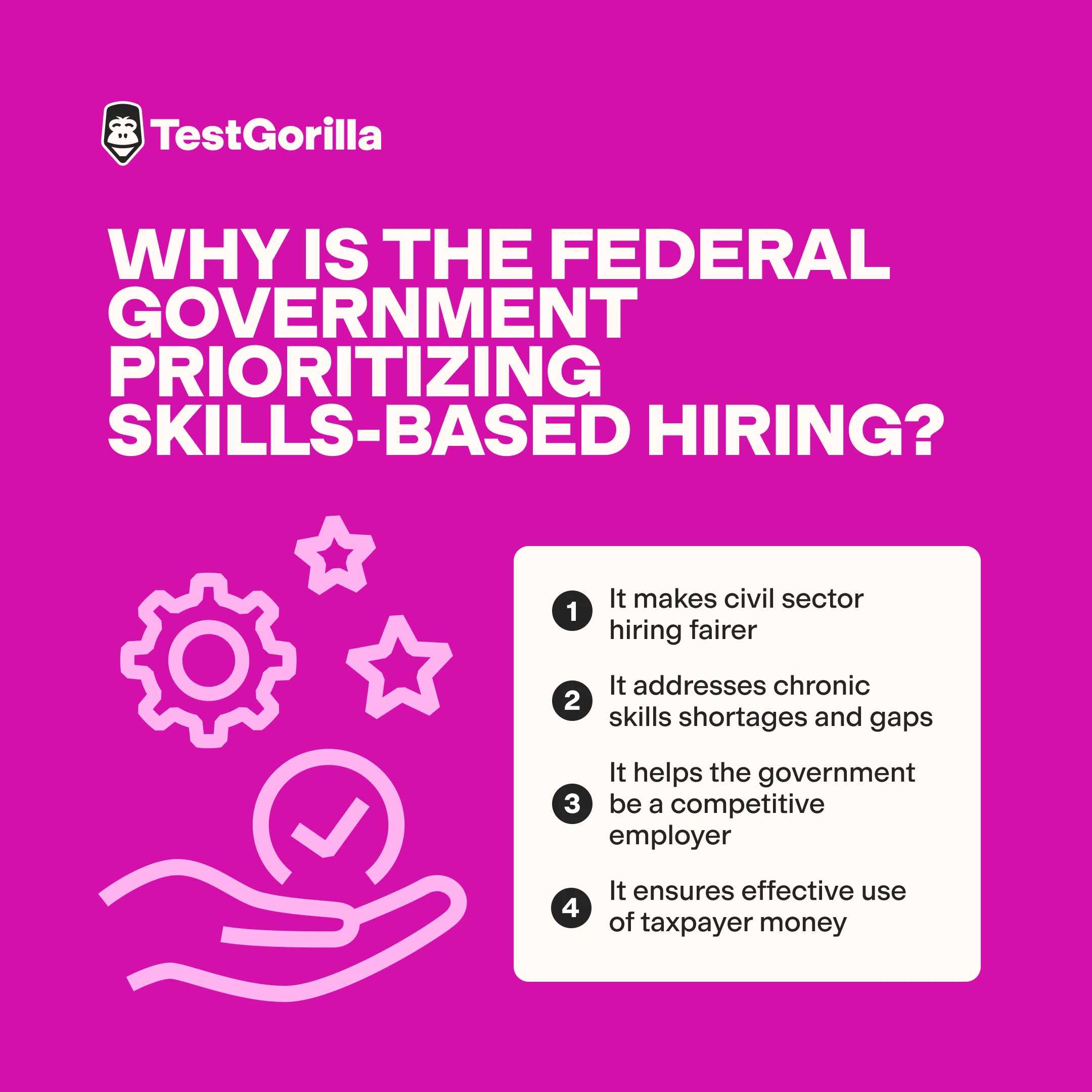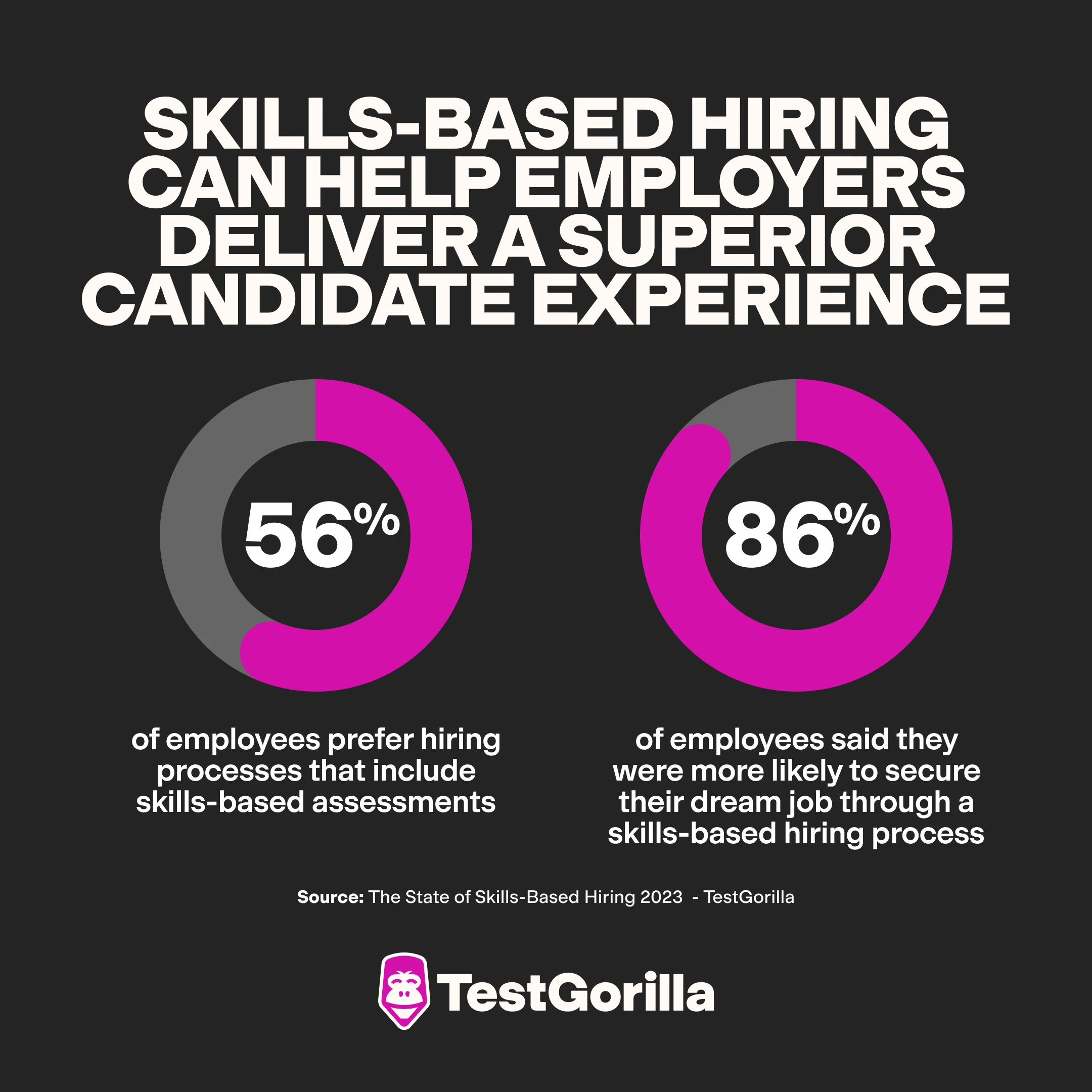The federal government is the largest employer in the US, with close to 3 million workers around the country. [1]
Despite this, the government’s approach to hiring hasn’t changed significantly in decades – until now. Over the last few years, a clear shift to skills-based hiring has emerged. This shift challenges the “paper ceiling” – a metaphor for the unofficial barriers that prevent skilled individuals without formal degrees from accessing certain career opportunities.
So, what does this shift mean for candidates and private employers? In this article, we outline the steps the US government is taking to prioritize skills in civil service hiring and the reasons for it, and we share our take on how it impacts candidates and private employers.
Table of contents
The shift to skills-based hiring: A timeline
A move to skills-based hiring – the practice of evaluating job candidates based on their skills rather than educational credentials or prior work experience – has been brewing in the federal government for several years, mainly as part of broader efforts to modernize the civil service hiring process. Here are several key events.
June 2020: Trump Administration executive order
In June 2020, President Trump issued an executive order directing that skills and competency-based hiring was to replace degree-based criteria in the federal civil service. As part of this, the Office of Personnel Management (OPM) – effectively the HR department for the federal civil service – was to review degree requirements for federal job postings within the following six months.
The order stated that minimum education requirements should be used only where legally required – for example, when hiring for regulated professions. Instead, federal agencies were directed to base job postings on the skills and competencies necessary for the role and identify ways to assess candidates' knowledge, skills, competencies, and abilities.
At the time, commentators questioned the practicality of the six-month timeframe, given the size of the federal government’s workforce. Others questioned the order’s lack of practical detail.
As Vice President at the Lumina Foundation, Chauncy Lennon, noted, “I think it’s an important statement of principle. What is the practical implication, it is less clear.”
January 2023: Chance to Compete Act
Under the Biden Administration, the House of Representatives passed the Chance to Compete Act bill with bipartisan support in January 2023.
The bill makes a shift towards skills-based hiring a legal requirement for federal agencies. Federal agencies must adopt measures that include:
Engaging subject matter experts (SMEs) to conduct resume reviews
Reducing reliance on employee self-assessments and instead using SMEs to develop skills assessments for specific roles for insights into candidates’ suitability for a role
The OPM will also create an online database of jobs requiring educational qualifications and the justification for these requirements. This database will be a valuable resource for pooled hiring actions, enabling agencies to share skills assessments and the details of suitable candidates.
James Comer, Chairman of the House Committee on Oversight and Accountability, noted, “The problem is that hiring for the federal civil service has over-relied on the paper credentials and self-administered job proficiency assessments of candidates. The [Chance to Compete Act] ensures agencies use objective, skills-based assessments to evaluate job candidates.”
The Senate is now considering the bill.
September 2023: OPM handbook
In September 2023, the OPM published the Federal Workforce Competency Initiative (FWCI) Competency Handbook. This handbook lists the skills needed or useful for each job category (referred to in federal hiring as an “occupational series”).
The OPM identified these skills based on a 2021 survey of more than 90,000 federal employees that asked them which skills were necessary to do their jobs successfully.
The handbook aims to introduce a consistent approach to skills-based hiring across federal agencies.
April 2024: Review of tech and cybersecurity rules announcement
The National Cyber Director announced in April this year that his office and the OPM will move all roles in the IT management series to skills-based hiring processes for employees and government contractors.
This announcement recognizes that many cybersecurity and tech industry workers learn skills through alternative routes – like coding bootcamps or apprenticeships – rather than college degrees.
According to the Director, this will help position the federal government as a leader in skills-based hiring (although the reality is that the federal government has a lot of ground to make up compared to the private sector – but more on that later).
In support of this, the OPM announced it will update the 2210 job series – which includes almost 100,000 IT roles – to prioritize skills-based hiring. This will involve reviewing the educational and assessment requirements for these roles.
April 2024: ACCESS Act
The Allowing Contractors to Choose Employees for Select Skills (ACCESS) Act bill was introduced in the House of Representatives in April this year.
The bill extends the shift to skills-based hiring beyond federal agencies to federal contractors. It requires federal agencies to remove college degree requirements for individuals working on federal contracts. Contractors must include written justifications for roles with minimum education requirements in their bids.
Representative Raja Krishnamoorthi, one of the representatives who introduced the ACCESS Act, said, “The federal government should be seeking the best and brightest to serve our country, and the ‘paper ceiling’ of arbitrary degree requirements is holding our nation and our workforce behind. Job candidates should always be evaluated based on their meaningful qualifications.”
The Office of Management and Budget will be responsible for overseeing and guiding the Act, as well as reviewing contractors’ written justifications.
Why is the federal government prioritizing skills-based hiring?
There are several reasons why skills-based hiring is at the forefront of federal hiring reform. Let’s take a look.
1. It makes civil sector hiring fairer
Removing minimum education requirements from job postings makes hiring fairer and supports workplace diversity. Degree inflation – requiring college degrees where they aren’t essential to the role – acts as a barrier to those with the necessary skills but not the qualifications.
These candidates are often skilled through alternative routes (STARs), like apprenticeships, on-the-job training, or self-directed learning. Often, these candidates are from minority groups – including African Americans, low-income earners, and women – who have historically had more limited access to education.
President Trump’s 2020 executive order highlighted this issue:
Degree-based hiring is especially likely to exclude qualified candidates for jobs related to emerging technologies and those with weak connections between educational attainment and the skills or competencies required to perform them. Moreover, unnecessary obstacles to opportunity disproportionately burden low-income Americans and decrease economic mobility.
While degrees are sometimes necessary for a limited range of roles – such as legal and medical professions – they rarely offer insights into a person’s skills and abilities relevant to the role.
The private sector already uses skills-based hiring to support equal employment opportunities and workplace diversity. For our 2023 State of Skills-Based Hiring Report, we spoke to 1,500 employers. Eighty-four percent said skills-based hiring positively impacted diversity in their workforces.
Melissa Barker, VP of practice development at recruiting firm Duffy Group Inc., also highlights that degree requirements lead to the government missing out on highly motivated candidates.
“In my experience doing government recruiting, the people who are most successful in government jobs are those that connect with the mission… they're passionate about public service, but they're prohibited from having the job because they don't have a degree.”
2. It addresses chronic skills shortages and gaps
Like many employers, the federal government has struggled to fill skills shortages and gaps over the past few years. According to the Bureau of Labor Statistics, there are currently around 143,000 job openings in the federal civil service.
The government can access a larger pool of suitable candidates by removing degree requirements from job postings and prioritizing skills.
The non-profit Opportunity@Work analyzed large public datasets and identified 71 million STARs currently active in the American workforce. This represents a significant source of talent that the US government could access by removing unnecessary degree requirements from roles across all its departments.
Skills-based hiring can also help the US government improve recruitment and retention of candidates with in-demand skills. According to the OPM, the most significant skills gaps for the federal government are in security, HR, and acquisition. By focusing on skills rather than resumes or qualifications alone, the government can identify candidates with the right skill sets to address these critical areas.
A skills-based approach is essential for attracting candidates with emerging skills, such as cybersecurity and AI skills. There’s a high demand for these skills across all sectors, and removing minimum education requirements reflects that these skills are often developed via real-world experience rather than college degree programs.
The OPM recognizes the importance of a skills-first approach to hiring for these roles. In April 2024, it issued guidance on hiring AI skills, including a Skills-Based Hiring Guidance and Competency Model for Artificial Intelligence Positions.
3. It helps the government be a competitive employer
With labor shortages affecting both the private and public sectors, standing out as an employer of choice is crucial for attracting quality talent. This is especially true when it comes to enticing younger applicants.
A recent survey involving 3,279 participants aged between 18 and 36 found low levels of trust in the federal government. As a result, only 21% of respondents agreed they’d like to work in the federal government.
With only 27% believing the federal government is diverse, improving diversity in the federal civil service through skills-based hiring is one way to address this.
Delivering a great candidate experience is another.
For its 2024 Candidate Experience Report, CareerPlug surveyed 500 recent job applicants across 11 industries. Seventy-six percent said that a positive experience during the hiring process influenced their decision to take the job. Two of the top five reasons candidates declined a job were a negative experience with people during the hiring process and the length of the hiring process.
Skills-based hiring can help employers deliver a superior candidate experience. During our survey of 1,500 employees, we found that the majority (56%) prefer hiring processes that include skills-based assessments. Moreover, 86% said they were more likely to secure their dream job through a skills-based hiring process.
The federal government can use skills-based hiring to improve candidate experience and improve its employer brand to attract more quality applicants.
4. It ensures effective use of taxpayer money
American taxpayers fund federal hiring processes and salaries. The government must ensure that taxpayer money is being used responsibly and that these processes are as efficient and effective as possible.
Skills-based hiring has been shown to reduce the time to hire. With access to a broader pool of candidates, tools like pre-employment skills assessments quickly highlight the most suitable candidates. Employers agree – in our State of Skills-Based Hiring Report, 82% of employers said the strategy reduced the time to hire, while 72% said it reduced the cost to hire.
Skills-based hiring also improves the quality of hires and employee retention. Interestingly, a Boston Consulting Group study of 11,332 roles found that the retention rate of workers without degrees was 10 percentage points higher for those with degrees. This aligns with our own findings, which showed that 89% of employers that used skills-based hiring improved retention.
Given that Gallup conservatively estimates the cost of replacing a worker to be 1.5 to two times their annual salary, skills-based hiring offers the government a way to save taxpayer money.
What about state governments?
State governments are facing the same challenges regarding skills gaps and labor shortages. However, the issue is much bigger, with around 492,000 vacancies in state government roles nationwide (not including education).
As a result, several states have also signaled a shift towards skills-based hiring for civil service employees.
For example:
Maryland led the charge by launching an initiative in March 2022 to eliminate four-year degree requirements from civil service job postings.
Pennsylvania’s governor signed an executive order in January 2023, removing degree requirements from around 65,000 state government jobs.
Ohio has introduced several measures to move its civil service to skills-based hiring. In May 2023, the governor signed an executive order requiring the Department of Administrative Services to review all roles that currently require formal qualifications to see if the requirements can be removed.
These aren’t isolated events. Other states have taken similar measures. Momentum is building, and more states are considering following suit. According to the National Governors Association, more than 12 states have removed bachelor’s degree requirements from public sector jobs in the last 18 months.
Our take at TestGorilla
The federal government is the largest employer in the US. When it comes to adopting a skills-first approach to hiring, the US government has the potential to lead by example for not only state governments but also the private sector.
At TestGorilla, we believe this would be good for everyone – it brings business benefits for employers, and candidates perceive benefits, too.
However, given the size of the federal government’s workforce, private employers may worry this shift could result in the civil service attracting talent away from the private sector.
Our take? The government has a long way to go to compete with private employers regarding skills-based hiring. While it’s encouraging that the federal government is moving towards skills-based hiring, it’s doing so at a much slower rate than the private sector.
When we surveyed 1,500 employers, we found that 73% of them are already using some form of skills-based hiring, and 60% plan to increase their spending on the hiring strategy.
The private sector is more agile than the wheels of government administration, which are notoriously slow. This is illustrated by the minimal progress made by the federal government since President Trump’s executive order in 2020.
While the federal government’s statements of principle towards skills-based hiring are promising, more action is needed.
So far, the government has focused on removing degree requirements from job postings. However, this seems to have had minimal practical impact on the makeup of the federal government’s workforce.
The 2020 OPM Federal Employee Viewpoint Survey of 624,800 federal employees noted that 26% of the federal government’s total workforce held a bachelor’s degree. The 2023 survey (which had 625,568 participants) indicated that 28% of the workforce holds a bachelor’s degree.
The federal government needs to move beyond removing minimum education requirements and take more tangible steps to prioritize skills. These include developing and delivering skills-based hiring training to hiring teams and managers, ditching resume screening altogether, enforcing the widespread use of skill assessments across all areas of government employment, and investing in upskilling existing employees.
For instance, by continuing to review resumes – even with the help of SMEs – federal agencies might still move candidates through the pipeline based on their educational and work experience credentials. Meanwhile, skilled STARs might be overlooked. A true skills-based hiring approach ditches resume screening altogether and uses assessments as screening tools.
The gist? A true transformation to skills-based hiring will require more than a few tweaks to job series. It requires a fundamental shift in mindset. Essentially, organizations must reinvent their talent acquisition processes. Changing an organization's culture is challenging, and altering the government's traditional mindset is especially tough.
The US government’s shift to skills-based hiring – Promising development, but underwhelming so far
While the US government’s efforts are a step in the right direction, it lags well behind the private sector in adopting skills-based hiring practices. The government needs to adopt more skills-based hiring practices across all its agencies. This will take time, but it’s an important shift for making the federal civil service more accessible, diverse, and efficient.
Luckily, the government has the private sector for inspiration. Ditching resumes, adopting skills-based talent assessments as screening tools, and more – there are many other practices the federal government could adopt today.
A government must represent the people it serves. To do this, the federal government needs to hire candidates based on what really counts – their skills and talents.
Sources
U.S. Bureau of Labor Statistics, All Employees, Federal [CES9091000001], retrieved from FRED, Federal Reserve Bank of St. Louis; https://fred.stlouisfed.org/series/CES9091000001.
Related posts
Hire the best candidates with TestGorilla
Create pre-employment assessments in minutes to screen candidates, save time, and hire the best talent.
Latest posts
The best advice in pre-employment testing, in your inbox.
No spam. Unsubscribe at any time.

Hire the best. No bias. No stress.
Our screening tests identify the best candidates and make your hiring decisions faster, easier, and bias-free.
Free resources
This checklist covers key features you should look for when choosing a skills testing platform
This resource will help you develop an onboarding checklist for new hires.
How to assess your candidates' attention to detail.
Learn how to get human resources certified through HRCI or SHRM.
Learn how you can improve the level of talent at your company.
Learn how CapitalT reduced hiring bias with online skills assessments.
Learn how to make the resume process more efficient and more effective.
Improve your hiring strategy with these 7 critical recruitment metrics.
Learn how Sukhi decreased time spent reviewing resumes by 83%!
Hire more efficiently with these hacks that 99% of recruiters aren't using.
Make a business case for diversity and inclusion initiatives with this data.





















